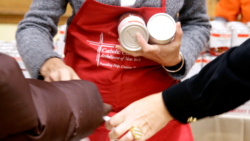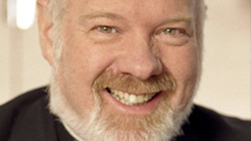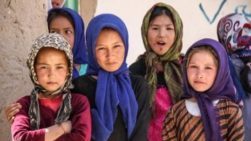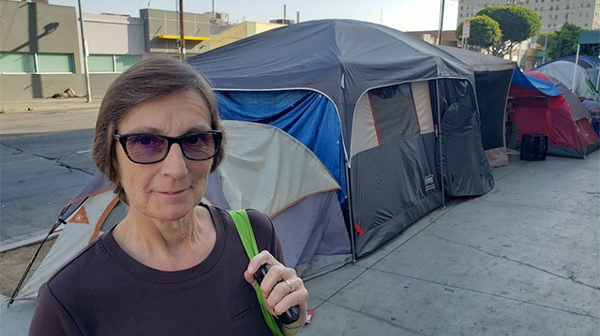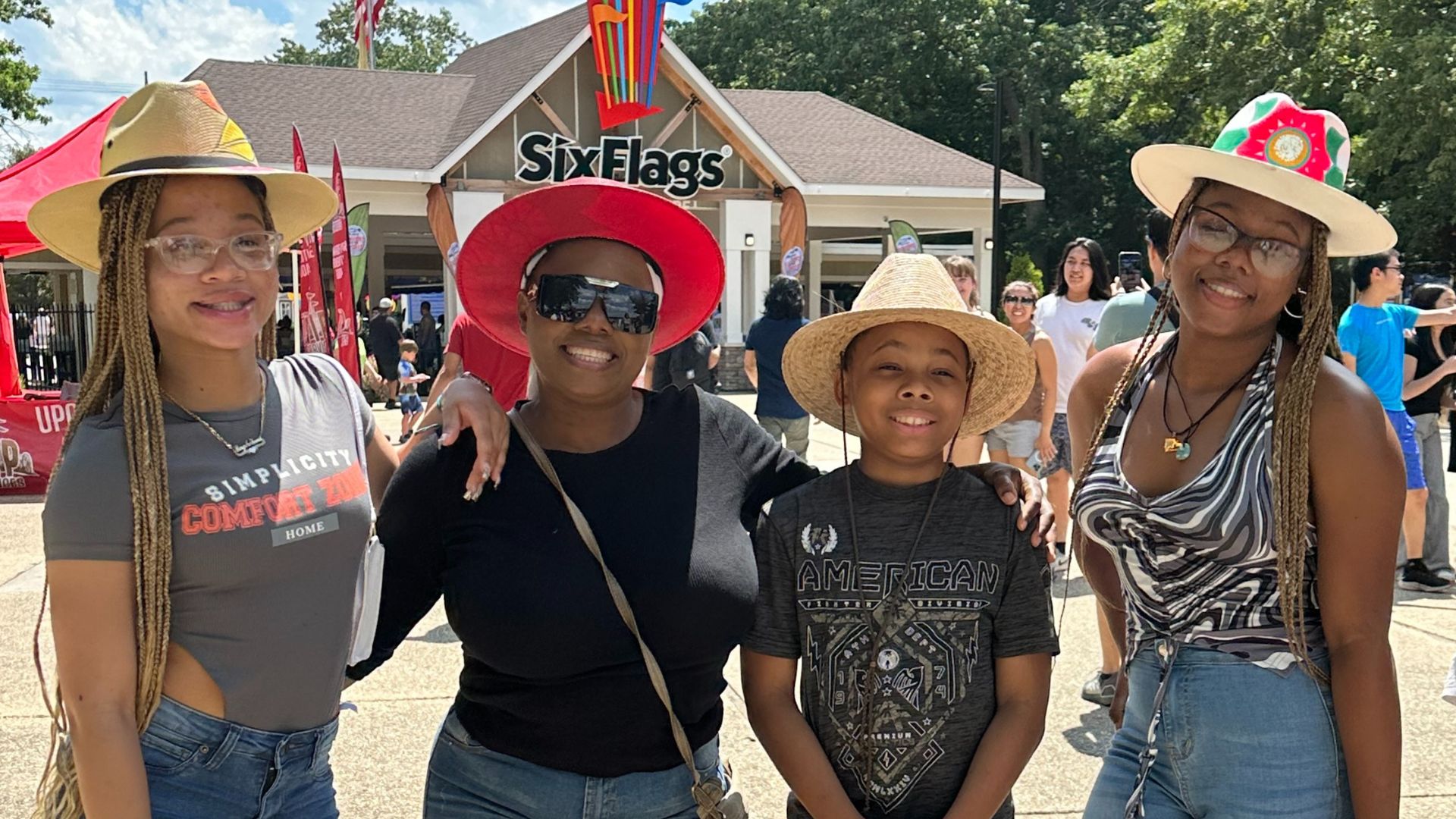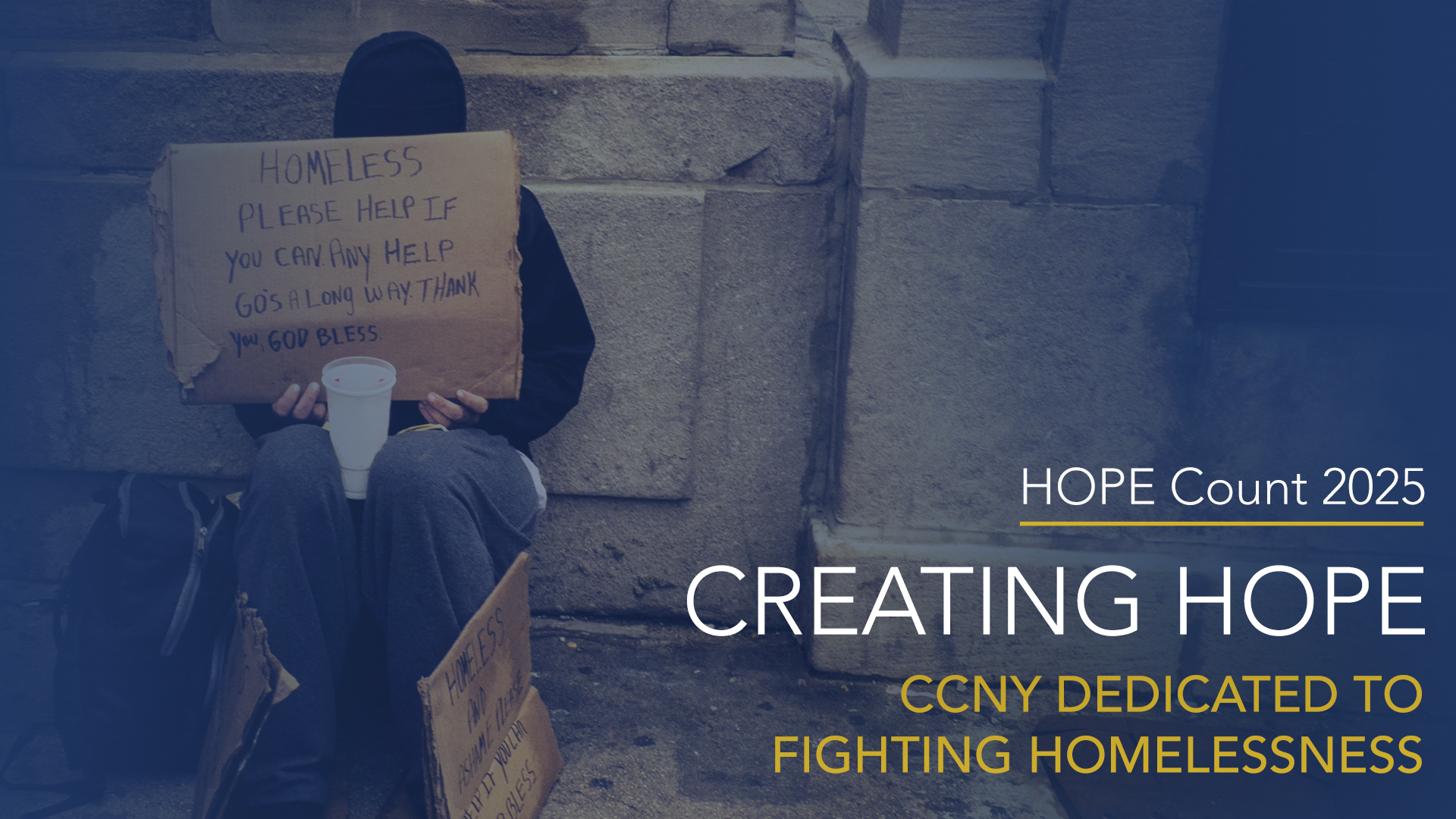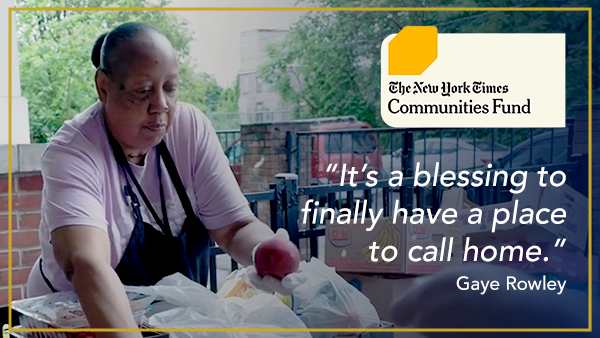Editor’s note: More than 1.6 billion people worldwide live in substandard housing. Of those, at least 150 million have no home at all. In this special series, A Place to Call Home, Global Sisters Report is focusing on women religious helping people who are homeless or lack adequate shelter. Over the next several months, we will examine how homelessness and a lack of affordable housing affect teens and young adults, families, migrants, the elderly and those displaced by natural disasters and climate change in stories from Kenya, India, Vietnam, Ireland, Puerto Rico, the Philippines, the United States and elsewhere.
LOS ANGELES — Thirty-seven-year-old Tommy Dunphy, a native of California’s San Gabriel Valley, is no stranger to the streets of Los Angeles’ Skid Row. He has known both homelessness and the perils of jail, having spent time in and out of prison for two decades for drug-related charges.
But Dunphy has been doing his best to live a “clean” life, keeping various addiction and mental health challenges at bay and managing his HIV. Taking care of Arianna, his beloved dog of two and a half years, is a cornerstone in his life. So is his low-rent, government-subsidized apartment in the Gateway apartment complex on Skid Row.
Another godsend is his longstanding friendship with Sr. Margaret Farrell, a member of the Religious Sisters of Charity, spiritual ministry coordinator at Covenant House California in Los Angeles and frequent visitor to Skid Row. As many as 60,000 people may be living on the streets at night in Los Angeles. In what is perhaps the most potent and visible symbol of homelessness in the nation’s second-largest city, hundreds of people live in tents on Skid Row — a risky and often dangerous life, exposing them to crime, drugs and prostitution.
The linked problems of homelessness and the lack of affordable housing are drawing urgent attention at the moment, though it is nothing new to Catholic sisters like Farrell who have championed the cause of shelter and housing in their ministries. Hundreds, if not thousands, of sisters are working in such ministries globally. And at the core of that ministry is a moral imperative grounded in the Gospel and the belief that having a home affords human dignity.
“No one should be living in the street, or in a car, or bouncing around from one relative’s couch to another,” said Mercy Sr. Helen Amos, a longtime housing and homelessness activist in Baltimore, Maryland. Dunphy says the ability to live in a safe, quiet apartment is the key to his success in the last three years. No more prison, he said. “I’m done doing time.” Dunphy’s story is a tale of quiet success. But sisters and others who minister to those experiencing homelessness feel overwhelmed with the increase of street homelessness in major American urban centers in recent years.
“More and more people are seeking out our services,” Farrell said. “We’re now totally stretched, completely stretched” — financially, emotionally, and physically. Stretched is also how public officials feel. With thousands now living on the streets in Los Angeles, the city’s mayor, Eric Garcetti, tried to draw attention to the problem prior to a Dec. 19 Democratic presidential primary debate held in Los Angeles. “Housing is no less of a fundamental need than regular meals or accessible medical care,” he said, “and it deserves to dominate the national conversation about our country’s future.”
The issue is starting to attract international attention, too: The United Nations estimates that 1.6 billion people live in inadequate housing worldwide, and 15 million people are forcefully evicted each year. The challenges of affordable housing and homelessness will take center stage at the Feb. 10-19 meetings of the United Nations’ Commission for Social Development, one of the U.N.’s main bodies dealing with development issues. Though housing is enshrined as a human right in the United Nations’ 1948 Universal Declaration of Human Rights, the meeting marks the first time the world body will tackle the issue head-on as a priority for action. And it comes as the U.N. continues its ambitious goal of eliminating world poverty by the year 2030 through its 17 sustainable development goals.
Back in Los Angeles, 68-year-old Siti Pasinah recounts experiences of escaping an 18-hour-a-day housekeeping job in Los Angeles after the household did not pay her for her work. She was also physically abused and had her passport taken from her. Escaping her abusive situation left Pasinah homeless.
“Oh, my God, it’s hard,” Pasinah said. Eventually, she found stability through Alexandria House, a transitional residence in Los Angeles for women who have experienced trafficking or domestic violence. Pasinah lived at Alexandria House from 1999 to 2000, moved to affordable housing near the residence in 2000 and eventually settled in a “permanent supportive apartment building” developed by Alexandria House in 2007.
One of Alexandria House’s missions is to help women like Pasinah move from emergency situations to permanent housing. Sr. Judy Vaughan, Alexandria House’s founding director, says Alexandria House is in touch with more than 100 of the 200 single women and families who have moved through the program since its founding in 1996. “Of this number, 90% have remained in permanent housing,” she said.
But for agencies like Vaughan’s, the challenges remain acute: Homelessness is becoming more visible given the realities of gentrification, the process by which onetime poorer urban areas become destination neighborhoods for wealthier residents, often forcing longtime residents to leave. “The struggle of people on the streets is all around us,” said Vaughan, a Sister of St. Joseph of Carondelet.
“Our vocation has always been drawn to the pain of the world,” said Sr. Simone Campbell, who heads the Washington, D.C.-based Network, the national Catholic social justice lobby. “Jesus always works toward those who are marginalized. And who is more marginalized in our society than those who don’t have a roof over their heads?” Campbell, interviewed while on a “listening tour” of rural America with colleagues in mid-January, noted that especially in the case of homelessness, “individual hearts [of sisters] are broken open so that sisters can’t be silenced in the face of need.”
Campbell said the issue of homelessness and affordable housing is an area of need “where there is the least amount of imagination” in terms of public policy. “The nation is still using the same policy and problem-solving that we did in the 1960s and ’70s. I believe that we need to be more imaginative in our approach to building homes,” she said. “We need to prioritize something other than ‘high-end condos.’ Rather, we must focus on housing for the bottom 60% of our population who are priced out of the current market.”
Campbell noted that homelessness affects rural areas, too. Challenges there include a lack of rental property and aging infrastructure, and many older, now-uninhabitable houses are in need of repair. “As rural communities lose population, people can’t sell their homes,” she said. “So they walk away from them. They get dilapidated and used for bad purposes, like drug houses and meth production.”
For millions, fundamental needs are not met
Anyone who focuses on issues of social inequality ultimately comes up against the challenges of homelessness and the lack of affordable housing, said Sr. Veronica Brand, who represents the Religious of the Sacred Heart of Mary at the U.N. Brand and other sisters whose advocacy work is based at the United Nations know the meetings this month are a starting point — the topic is complex and multi-layered. They note that some U.N. member states are likely to say homelessness is best addressed at local or perhaps national levels, not globally.
But Brand and others see global dimensions in the millions made homeless because of climate-crisis events or in “the global economic system that is promoting an ever-widening gap between rich and poor,” Brand said. Central to Brand’s concern is that in such a system, “everything is treated as a commodity, including housing,” she said. Housing should be seen as a basic human right, and the “basic right to housing should not be dependent on markets,” she added.
Policymakers at all levels need to acknowledge that “people are caught in a vicious circle of circumstances which prevent them from being self-reliant,” Brand said. In Brazil, she said, that means LGBT youth who become homeless after their families kick them out of their homes. Or those who live on the streets of large Brazilian cities, collecting recyclable plastics and cans. In Mozambique, it means thousands have been made homeless because of climate-induced floods.
“No one can escape the fact that many people in the world are not having some of their fundamental needs met,” Brand said. None of the existing sustainable development goals deals explicitly with homelessness or affordable housing, though many of the goals touch on those challenges. Goal No. 11, for example, calls on U.N. member states to “ensure access for all to adequate, safe and affordable housing and basic services, and upgrade slums.”
Leilani Farha, the United Nations special rapporteur on adequate housing, calls the February meetings a “strategic and important moment” as well as an opportunity “to bring the issue of homelessness to the attention of U.N. member states and to convey to the states the urgency of the violation of human rights caused by homelessness.”
Globally, she said, there is a “nearly universal dynamic of wages being stagnant and rents escalating.” But there are other dynamics, too, such as equity firms and pension funds moving into buying up affordable housing stock and increasing prices. “It’s a business model in which profit is being squeezed out of housing,” Farha said. “In large cities such as San Francisco, middle-class people were once able to afford an apartment at, say, $1,000 a month. What has happened is that a building is bought, rents go up substantially and people can’t make their rent payments.
“Housing has long been commodified through mortgage systems, for example,” she said. But the current situation is different. It’s gone beyond commodification to financialization, where massive amounts of capital are being invested in real estate. Residential real estate is now the place to park, grow and leverage capital. That’s a new dynamic, and that’s what I’m worried about.”
There are other challenges ahead of the February meeting. For one, a document prepared for the U.N. meetings notes that “there is no universally agreed definition of homelessness.” A group of experts, including Daughter of Wisdom Sr. Jean Quinn, met in Nairobi, Kenya, in May 2019 and came up with a preliminary working definition: Homelessness is “a condition where a person or household lacks habitable space with security of tenure, rights and ability to enjoy social relations, including safety.”
Quinn, executive director of UNANIMA, a United Nations-based coalition of Catholic congregations focused on concerns of women, children, migrants and the environment, said she hopes one of the outcomes of the U.N. meetings this month is a consensus about a definition. She said she also hopes the U.N. will take steps toward a universal count, or census, of homelessness. “If you don’t have that, governments will put in something to suit themselves,” she said. And if there is not a common definition, “governments will create their own definition, making it hard to compare and combat the issues on homelessness globally.”
Quinn acknowledged that it is frustrating that, as the U.N. notes, the last time the United Nations attempted to count the global number of homeless people was in 2005, when it estimated that 100 million people were homeless. (UN-Habitat, the U.N. body that focuses on adequate shelter and the development of sustainable urban areas, uses a more recent estimate of 150 million.) Quinn, who will be one of the featured speakers during the U.N. gathering, said she hopes the meetings will also call attention to a facet of homelessness that does not get the attention she believes it deserves: family homelessness.
She calls family homelessness “a hidden problem” that often involves head-of-household mothers and their children unable to find permanent housing, living in shelters, hostels, hotels or institutional settings and often “on the move.” “We welcome that the U.N. is now talking about the issue,” said Quinn, a founder of Sophia Housing in her native Ireland, which describes itself as “a collaboration of religious and lay people working to support the ‘out of home.’ “
Housing as a human right
It is not likely that the U.N.’s declaration that housing is a human right will gain much traction in the market-driven culture of United States, said Nan Roman, the president and chief executive officer of the National Alliance to End Homelessness, a public education and advocacy organization. However, she and other advocates, like the sisters, believe “it should be a right. People have a right to basic human needs.”
Her organization noted that the U.S. Department of Housing and Urban Development’s 2019 Annual Homeless Assessment Report to Congress, called AHAR, said an estimated 567,715 people “were identified homeless on a single night in 2019,” representing “a 2.7 percent increase over 2018.” Given the increased visibility of street homelessness in large U.S. cities, this might be the time to broaden the parameters of the debate, she said.
Roman said people don’t like to see other humans living on the streets: “It hurts their hearts to see it.” She said she believes there is “still a tremendous amount of compassion and feeling that government has a role. We need to focus on that.” “In the U.S., we could ensure that everyone is housed,” Roman said. “We could afford that, but it’s a matter of priorities.”
Roman said investing in more affordable housing could lower the economic and social costs of homelessness. As it is now, “there are costs to the economy, social costs, human costs. Thirty percent of homeless people in the United States have no shelter at all. This is a wealthy nation. That should be unacceptable to all of us.” It is certainly unacceptable to the sisters working on the issue, a fact Roman acknowledged as she reflected on the upcoming U.N. meetings.
“Working to advance a social justice agenda at the U.N. requires tremendous attention to the details of process and the makeup of the various delegations and committees. It entails deliberation over text down to the individual words,” she said. “It involves persistence over months, or even years. It is not for the faint of heart, and the Catholic sisters most certainly are not that.”
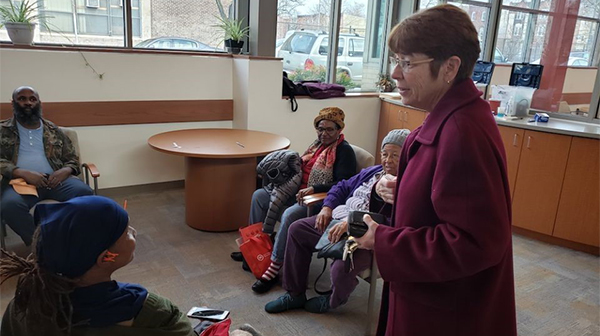
One of the most visible sister-activists in the country is Sr. Mary Scullion, a member of the Sisters of Mercy and one of the co-founders of Project HOME in Philadelphia. While calling the overall problem of homelessness and housing affordability a complicated issue with many facets, Scullion also argued that at its roots, “poverty is the fundamental cause of homelessness.”
Philadelphia has seen a 10% annual rise in housing costs in recent years, making housing less and less accessible to those with lower incomes, Scullion said. A recent report noted that median rent in Philadelphia rose 3% from 2018 to 2019 and now stands $1,614 per month, or $19,368 per year. That is more than 30% of Philadelphia’s median household income of $46,116, the rate often cited as the suggested portion of income used to pay for housing.
“Affordable housing is becoming scarcer,” Scullion said, “and safe, quality and affordable housing is becoming even scarcer.” Scullion said she knows only the broad outlines of what will be discussed at the United Nations this month. But in terms of the United States, government policies and legislation tend to be “bought and sold by moneyed interests today,” she said, citing the power and sway of such prominent figures as the Koch brothers.
Something of a national consensus following World War II about the need for affordable housing for all has evaporated, she said. The landmark 1949 Housing Act, for example, declared that “the general welfare and security of the nation” required a “national housing policy to realize, as soon as feasible, the goal of a decent home and a suitable living environment for every American family.” Scullion said she believes the consensus began to fade during the 1980s, when Reagan administration policies began chipping away at the federal commitment to affordable housing, such as reducing federal subsidies for the construction of low-income housing.
“In the 1980s, housing policies were dismantled in certain ways,” she said. “Housing became more of a commodity and not a right.” The result? A current social challenge and a feeling that “for ordinary citizens, it’s hard to see how we can influence policies since special interests have such power over public policy,” she said. “It’s not equal. It’s the world of lobbyists and special interests.”
Project HOME and the work of other groups have countered this trend. In addition to its immediate work of assisting those on the street, Project HOME has, it says, “developed 832 units of affordable and supportive housing for persons who have experienced homelessness and low-income persons at-risk of homelessness in Philadelphia.” Its goal is to eventually complete 1,088 units of affordable housing in the near future; an additional 104 units are currently under construction.
Someone thankful for that work is David Brown, who helps manage a used-clothing boutique store run by Project HOME and rents an apartment in a building the agency built. Brown, who used to be homeless, said it is no secret what homeless people need: a place to live and to find security and comfort. “We don’t need shelters,” he said, adding that you can’t go to a job interview from a place that’s not clean and healthy. Housing will “help us navigate to get off the streets.”
“Folks like David want to work, pay rent, volunteer and be involved in making their communities better,” she said. Like Dunphy in Los Angeles, Brown said he believes housing is the cornerstone for a dignified life. “You have to start with housing,” he said. “Give us affordable housing.”
Copyright © 2020 Global Sisters Report, A Project of National Catholic Reporter www.GlobalSistersReport.org Reprinted with permission of National Catholic Register


